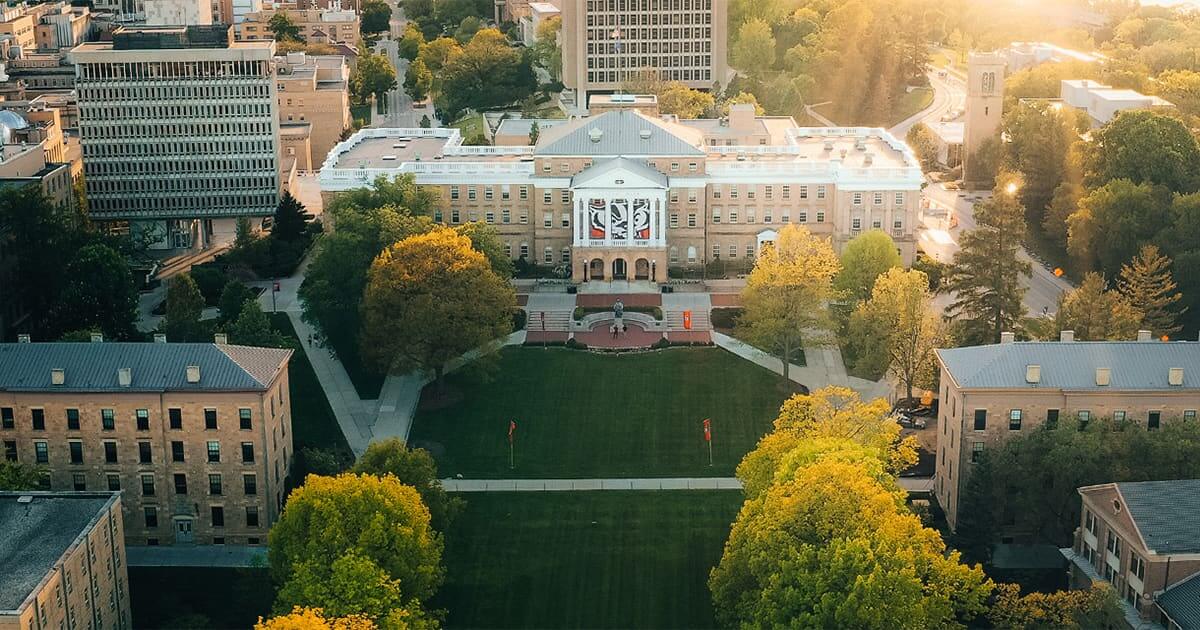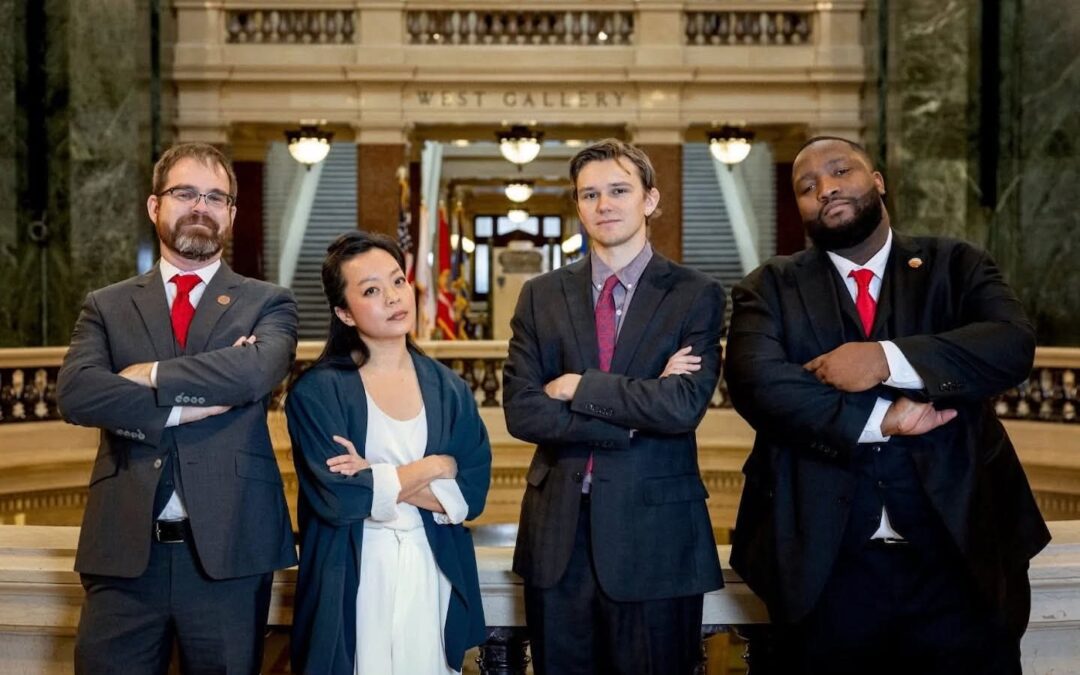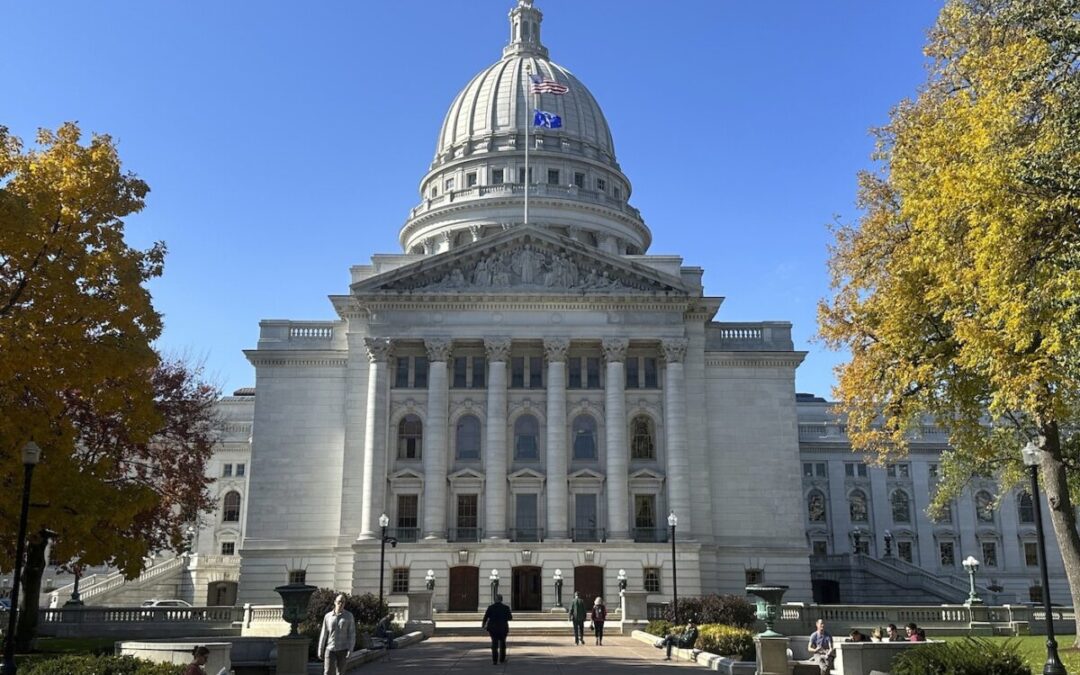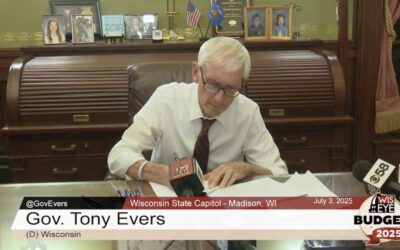
UW-Madison campus (photo via UW-Madison).
Regents vote down a deal negotiated between the university system president and Assembly Speaker Robin Vos. (Update: Regents would reverse themselves days later.)
[Editor’s Note: This story is superseded by a newer version: Three UW Regents Flip Their Votes, Allow GOP to Attack Diversity Efforts in Exchange for Funding]
In a surprising 9-8 Saturday vote, the Board of Regents for the Universities of Wisconsin (formerly the University of Wisconsin System) rejected an agreement reached between the system president and the Legislature’s most powerful Republican, which would have ended a block Assembly Speaker Robin Vos has been putting on the pay raises of tens of thousands of UW employees as part of his assault on campus diversity efforts.
Vos and Universities of Wisconsin President Jay Rothman announced the deal on Friday that would have led to a reconfiguration in positions dedicated to campus diversity. The system would also have had to end a diversity program involved with hiring and seek “philanthropic support for a professor who would focus on conservative thought, classic economic theory or classical liberalism, depending on the donor’s interest.”
In return, Vos would stop blocking $800 million in pay raises for approximately 30,000 UW workers. Vos has been using a legislative maneuver to hold up the raises even though the Legislature has already approved them as part of the new state budget signed into law by Gov. Tony Evers over the summer.
The deal also called for Vos and GOP lawmakers to reverse their initial rejection of $200 million to help fund a new engineering building on the flagship Madison campus. Republicans took it out of the state budget bill even though it was a top priority of business lobbying during the session and has secured significant commitments from private sector funding partners.
However, in Saturday’s emergency board meeting, several regents spoke about the need to protect the UW from political interference, especially as it relates to diversity initiatives that enhance the collegiate experience and play a crucial role in identifying promising students who grew up with fewer resources.
“I don’t like this precedent,” said Regent Dana Wachs of Eau Claire, a former Democratic legislator. “We need to make this a welcoming environment.”
Regent Angela Adams said any deal to stop blocking already-approved funding “in exchange for insulting people historically excluded and underrepresented in higher education is a nonstarter for me. It’s divisive, it’s polarizing, and will ultimately lead to even more negative effects on the university system,” according to a story in the Milwaukee Journal Sentinel.
Other legislators and UW supporters expressed furious opposition to the deal when it was announced on Friday, with members of the Legislative Black Caucus asking, “Who was at the table making negotiations on behalf of our Black and brown students on campus? Who decided to undervalue our students and staff of color by setting a price tag on their inclusion?”
“It was an arduous process,” Rothman said Friday afternoon during a WisPolitics forum. “It was a difficult process. And with all compromises, concessions needed to be made.”
Vos, reacted to the rejection in a social media post Saturday: “It’s a shame they’ve denied employees their raises and the almost 1b investment that would have been made in the UW System all so they could continue their ideological campaign to force students to believe only one viewpoint is acceptable on campus.”
Vos targeted diversity programs early in the budget debate. In June he said he was “embarrassed to be a UW alumni” (Whitewater, 1991) because of the existence of Diversity, Equity, and Inclusion (DEI) offices and positions. Vos called the elimination of the programs “the single most important issue that we are facing as a people, as a nation and as, really, humanity.”
While DEI programs include efforts to assist minority students—in a state noted for a high degree of racial disparity in education—the programs also help improve campus diversity in other ways, such as helping veterans transition to university settings and improving access for women in fields such as science and engineering.
Even as the state enjoys a multi-billion dollar record budget surplus, Vos ensured that the new budget cut funding for the UW by a symbolic $32 million, representing his estimate of the cost of the DEI programs and posts. After Gov. Tony Evers reallocated funds to protect the DEI mission, Vos put a block on the pay raises.
Evers has filed a lawsuit against the Legislature and is asking a court to find that lawmakers are acting unconstitutionally to block actions in a separate branch of government.
Interviewed Tuesday by WISN-TV, Evers said the pay raises should never have been held up because legislators had already approved them in the state budget, which made it hard for him to be supportive of the recent negotiations with UW leadership.
“I find it hard, just personally, to say ‘this is really great, keep it up,’ because I think it’s all B.S.” Evers said. “This idea that somehow we’re going to go back and forth and back and forth, that’s the Universities of Wisconsin’s issue. I really find it quite obnoxious, frankly.”
Senate Republican Leader Devin LeMahieu said earlier in the week that he did not agree with Vos on withholding the money, but felt an agreement would be worked out shortly.
Agreement Details
The rejected agreement would have seen UW leadership reduce one-third of campus DEI positions and “freeze all positions throughout the system including DEI positions for the next three years.”
Another part of the agreement was worded by Vos to say the university will “develop and implement on all campuses a module regarding freedom of expression for entering undergraduate students.” The UW would also seek “philanthropic support for a professor who would focus on conservative thought, classic economic theory or classical liberalism, depending on the donor’s interest.”
Rep. David Murphy (R-Greenville), chair of the Assembly Colleges and Universities Committee, was more blunt in his feelings about the university environment, calling this part of the agreement a positive step in “preparing students so as they transition out of the liberal bubbles and into society, they are both open-minded and respectful of other perspectives.”
The Madison campus would have also had to end a program that seeks to recruit educators of color and “eliminate any requirement for a diversity statement in the system-designed admissions application.”
Legislative Black Caucus Chair Rep. Dora Drake (D-Milwaukee) told the Milwaukee Journal Sentinel she is already getting reaction from students of color about the terms of the deal.
“It sends a bad message, communicating that DEI has a price tag,” said Drake. “How does this deal communicate to our students and faculty of color that they are supported on these campuses? That is the question.”
The university system will also receive funds for various other buildings, including two on the Whitewater campus that Rothman said were requested by Vos.
Rothman, who had no prior higher education management experience before his appointment to the president’s post, framed the agreement as a compromise.
“We tried to do that in a way that unbeknownst created something that I think is in the best interests of the Universities of Wisconsin,” Rothman said. “I believe that we have positioned ourselves with the investments that are freed up and how we can work with positions and continue to live our core values around diversity and inclusion, that on balance, is in the best interests of the universities.”
Another part of the agreement called on the UW to amend its admissions policy so that the “top five percent of academic performers will be guaranteed admission to all other UW schools.” The announcement does not specify if any of those students would receive financial aid if their families could not afford to follow-up on any guaranteed acceptance.
Media reports indicate Regents Bob Atwell, Héctor Colón, Mike Jones, Jim Kreuser, Cris Peterson, Ashok Rai, Mark Tyler and Kyle Weatherly voted for the agreement. It was voted down by Regents Wachs, Karen Walsh, Amy Bogost, Angela Adams, Evan Brenkus, Ed Manydeeds, John Miller, Joan Prince, and Jennifer Staton. State Superintendent of Public Instruction Jill Underly was absent.
Support Our Cause
Thank you for taking the time to read our work. Before you go, we hope you'll consider supporting our values-driven journalism, which has always strived to make clear what's really at stake for Wisconsinites and our future.
Since day one, our goal here at UpNorthNews has always been to empower people across the state with fact-based news and information. We believe that when people are armed with knowledge about what's happening in their local, state, and federal governments—including who is working on their behalf and who is actively trying to block efforts aimed at improving the daily lives of Wisconsin families—they will be inspired to become civically engaged.


Opinion: The ‘socialist’ label holds me accountable to values of service to all
The Wisconsin Legislature’s Socialist Caucus emphasizes the power of “public,” starting with supporting public education. I was elected to the...

Head Start moms won’t let Washington cut their kids’ future
While many of us were slapping on sunscreen and trying to soak up the last days of summer, moms across the country were dialing—and redialing—their...

In a ‘Love Letter to Wisconsin,’ Tony Evers explains why he won’t run for governor again
The announcement from Wisconsin’s two-term chief executive triggers wide-open 2026 primaries in both parties. Tony Evers, who defeated Scott Walker...

It’s what’s not in the state budget that is generating both anger and 2026 candidates
From homeless veterans to childcare to school funding, there are a lot of missing numbers that have some people talking and others taking action....





